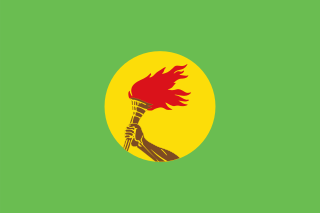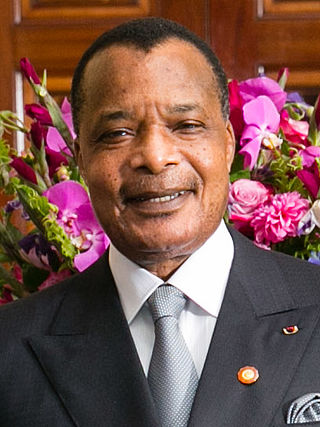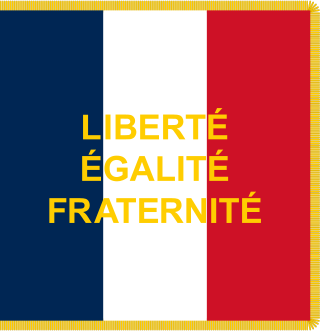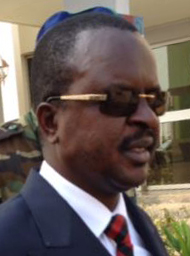Related Research Articles

Politics of the Democratic Republic of Congo take place in a framework of a republic in transition from a civil war to a semi-presidential republic.

Zaire, officially the Republic of Zaire, was the name of the Democratic Republic of the Congo from 1965 to 1997. Zaire was located in Central Africa and was, by area, the third-largest country in Africa, and the 11th-largest country in the world. With a population of over 23 million inhabitants, Zaire was the most populous officially Francophone country in Africa, as well as one of the most populous in Africa.

The Democratic Republic of the Congo (DRC), also known as Congo-Kinshasa, the DR Congo and formerly known as Zaire, is a country in Central Africa. By land area, the DRC is the second-largest country in Africa and the 11th-largest in the world. With a population of around 112 million, the Democratic Republic of the Congo is the most populous officially Francophone country in the world. The national capital and largest city is Kinshasa, which is also the economic center. The country is bordered by the Republic of the Congo, Central African Republic, South Sudan, Uganda, Rwanda, Burundi, Tanzania, Zambia, Angola, the Cabinda exclave of Angola and the South Atlantic Ocean.

Denis Sassou Nguesso is a Congolese politician and former military officer. He has served as president of the Republic of the Congo since 1997. He served a previous term as president from 1979 to 1992. During his first period as president, he headed the Congolese Party of Labour (PCT) for 12 years. He introduced multiparty politics in 1990, but was stripped of executive powers by the 1991 National Conference, remaining in office as a ceremonial head of state. He stood as a candidate in the 1992 presidential election but placed third.

The French Fourth Republic was the republican government of France from 27 October 1946 to 4 October 1958, governed by the fourth republican constitution of 13 October 1946. It was in many ways a revival of the Third Republic, which governed from 1870 during the Franco-Prussian War to 1940 during World War II, and it suffered many of the same problems.

The current Constitution of France was adopted on 4 October 1958. It is typically called the Constitution of the Fifth Republic(French: Constitution de la Ve République), and it replaced the Constitution of the Fourth Republic of 1946 with the exception of the preamble per a Constitutional Council decision in July 1971. The current Constitution regards the separation of church and state, democracy, social welfare, and indivisibility as core principles of the French state.

The president of Georgia is the ceremonial head of state of Georgia as well as the commander-in-chief of the Defense Forces. The constitution defines the presidential office as "the guarantor of the country's unity and national independence."

The president of the Democratic Republic of the Congo, is the head of state of the Democratic Republic of the Congo and commander-in-chief of the armed forces.
A provisional government, also called an interim government, an emergency government, or a transitional government, is an emergency governmental authority set up to manage a political transition generally in the cases of a newly formed state or following the collapse of the previous governing administration. Provisional governments are generally appointed, and frequently arise, either during or after civil or foreign wars, or during difficult times such as during invasion, economic crisis, or widespread infiltration of saboteurs and counter-revolutionaries such as during the French Revolution.

The Constitutional Council is the highest constitutional authority in France. It was established by the Constitution of the Fifth Republic on 4 October 1958 to ensure that constitutional principles and rules are upheld. It is housed in the Palais-Royal, Paris. Its main activity is to rule on whether proposed statutes conform with the Constitution, after they have been voted by Parliament and before they are signed into law by the President of the Republic, or passed by the government as a decree, which has law status in many domains, a right granted to the government under delegation of Parliament.

Direct elections in the Democratic Republic of the Congo occur for the Presidency, National Assembly, and provincial assemblies. The Senate, the upper house of the legislature, is elected indirectly by members of the provincial assemblies.

The French Community was the constitutional organization set up in 1958 between France and its remaining African colonies, then in the process of decolonization. It replaced the French Union, which had reorganized the colonial empire in 1946. While the Community remained formally in existence until 1995, when the French Parliament officially abolished it, it had effectively ceased to exist and function by the end of 1960, by which time all the African members had declared their independence and left it.
The Constitution of the Republic of Iraq is the fundamental law of Iraq. The first constitution came into force in 1925. The current constitution was adopted on September 18, 2005 by the Transitional National Assembly of Iraq, and confirmed by constitutional referendum, held on October 15, 2005. It was published on December 28, 2005 in the Official Gazette of Iraq, in Arabic original, and thus came into force. An official translation into English for international use was produced in cooperation between Iraqi state authorities and the United Nations' Office for Constitutional Support. Since 2006, several proposals for adoption of various constitutional amendments were initiated. The Kurdish language is official at state level.

The Tricameral Parliament, officially the Parliament of the Republic of South Africa, was the legislature of South Africa between 1984 and 1994, established by the South African Constitution of 1983, which gave a limited political voice to the country's Coloured and Indian population groups. The majority Black population group was however still excluded, their interests notionally represented in the governments of the black homelands, or "bantustans", of which they were formally citizens. As these institutions were largely politically impotent, its principal effect was to further entrench the political power of the White section of the South African population.

A parliamentary republic is a republic that operates under a parliamentary system of government where the executive branch derives its legitimacy from and is accountable to the legislature. There are a number of variations of parliamentary republics. Most have a clear differentiation between the head of government and the head of state, with the head of government holding real power and the head of state being a ceremonial position, similar to constitutional monarchies. In some countries the head of state has reserve powers to use at their discretion as a non-partisan "referee" of the political process. Some have combined the roles of head of state and head of government, much like presidential systems, but with a dependency upon parliamentary power.

The Constitution of the Republic of Chad is the supreme law of Chad. Chad's seventh constitution, it was adopted in 1996, six years after President Idriss Déby rose to power following a successful rebellion against President Hissène Habré, this formal document establishes the framework of the Chadian state and government and enumerates the rights and freedoms of its citizens. In its current form, the contents of the Constitution include a preamble, 16 parts and 225 articles.
Justin Koumba is a Congolese politician who was President of the National Assembly of Congo-Brazzaville from 2007 to 2017. He was an official at the United Nations and served in the government of Congo-Brazzaville as Minister of National Education in 1992; subsequently, he was President of the National Transitional Council from 1998 to 2002 and President of the National Human Rights Commission from 2003 to 2007.

The politics of France take place with the framework of a semi-presidential system determined by the French Constitution of the French Fifth Republic. The nation declares itself to be an "indivisible, secular, democratic, and social Republic". The constitution provides for a separation of powers and proclaims France's "attachment to the Rights of Man and the principles of National Sovereignty as defined by the Declaration of 1789".

Alexandre-Ferdinand Nguendet is a Central African politician who served as President of the National Transitional Council of the Central African Republic from 2013 to 2016. He briefly served as Acting President of the Central African Republic in January 2014.
References
- ↑ “Legislatures around the world”.C-Span.org C-SPAN.
- ↑ Conseil national de transition: Constitution (2011)
- ↑ "Republic of the CONGO (Brazzaville)" (PDF). United Nations. March 2001. Archived from the original (PDF) on 28 September 2011. Retrieved 26 August 2011.